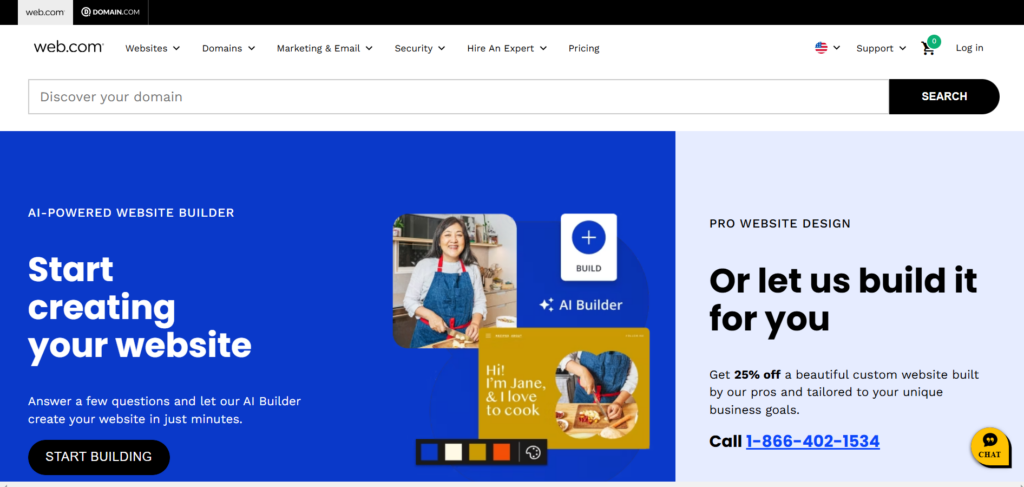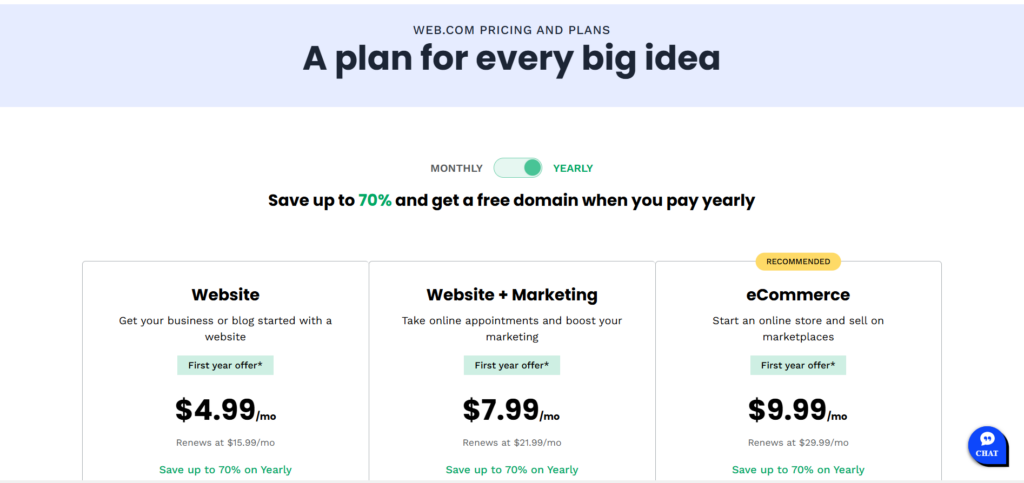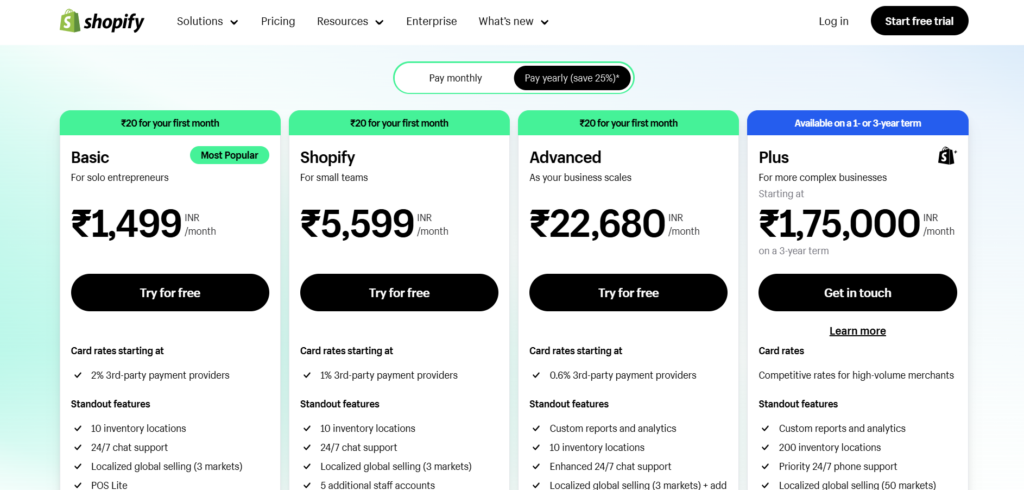Choosing between Web.com and Shopify comes down to what you’re building your website for. I’ve been there—trying to find the right platform to match my needs without spending too much time or money. Both are great, but they’re designed for very different purposes.
Web.com is best for simple websites or small businesses that need a quick, affordable solution. It’s easy to use and budget-friendly, making it a good choice for beginners.
Shopify, on the other hand, is built specifically for e-commerce. If you’re planning to sell products online, Shopify offers powerful tools for managing inventory, payments, and even marketing.
So, which is better? If you’re focused on selling online, Shopify is the clear winner. But if you just need a basic website or don’t plan to sell much, Web.com might be a better fit. Let’s compare their features, pricing, and tools to help you decide!
Web.Com
Web.com is a leading provider of online services designed to help individuals and small businesses build and enhance their online presence.

Offering website design, domain registration, hosting, and digital marketing services, Web.com aims to simplify the process of establishing and growing an online footprint.
With user-friendly tools and expert support, it caters to businesses of all sizes, helping them reach a broader audience.
The platform also includes SEO, e-commerce, and social media management solutions, making it a one-stop shop for digital success.
Known for its affordability and reliability, Web.com is a trusted choice for those starting or expanding their online journey.
Shopify
Shopify is a leading e-commerce platform that enables individuals and businesses to create and manage online stores with ease.

It offers a comprehensive suite of tools for website design, payment processing, inventory management, and marketing.
Shopify supports businesses of all sizes, from small startups to large enterprises, with customizable templates, integrations, and apps. Its user-friendly interface and powerful backend make it accessible for non-technical users while providing advanced features for developers.
Shopify also supports multichannel selling, allowing businesses to connect with customers across social media, marketplaces, and brick-and-mortar locations, empowering entrepreneurs to grow and scale their online presence efficiently.
Features Comparison: Web.Com vs Shopify
When comparing Web.com and Shopify, it’s essential to consider their features to determine which platform aligns best with your business needs.
1. Website Management:
- Web.com: Offers a centralized dashboard for managing domains, emails, store settings, branding, and hosting. It includes built-in SEO tools and social media integrations to enhance site visibility and audience engagement.
- Shopify: Provides a dashboard tailored for e-commerce, facilitating inventory management, order processing, and customer interaction tracking. Its app marketplace allows for expanded store capabilities and task automation.
2. Security:
- Web.com: Beyond standard SSL certificates, it conducts daily malware and vulnerability scans and offers automated backups for data protection.
- Shopify: Includes SSL certificates for secure data transmission and complies with PCI-DSS standards to safeguard customer payment information.
3. Customer Support:
- Web.com: Provides general support via phone and live chat for various business-related issues.
- Shopify: Offers support specifically designed to assist with e-commerce challenges, making it particularly useful for online store-related inquiries.
4. Design and Customization:
- Web.com: Features a drag-and-drop website builder with customizable templates, suitable for users seeking a straightforward design process.
- Shopify: Offers a variety of free and premium themes optimized for e-commerce, with customization options accessible through its editor or by editing code for advanced users.
5. E-commerce Capabilities:
- Web.com: Provides basic e-commerce functionalities, including secure payment options and integration with popular marketplaces and social media platforms.
- Shopify: Designed specifically for e-commerce, it supports unlimited products, multichannel selling, abandoned cart recovery, and a wide range of third-party app integrations to enhance store functionality.
6. Scalability:
- Web.com: Suitable for small to medium-sized businesses seeking a stable online presence.
- Shopify: Caters to businesses of all sizes, offering advanced features and scalability for growing enterprises.
Why Web.com Might Be Preferred:
Cost-Effectiveness: Web.com offers more affordable pricing plans compared to Shopify, which can be crucial for businesses with limited budgets.
All-in-One Solution: Provides a centralized platform for managing various aspects of an online presence, including domain settings, email setups, and hosting, which can simplify website management.
Ease of Use: The drag-and-drop customization and AI content creation tools make it accessible for users without technical expertise.
In summary, while Shopify offers robust e-commerce features, Web.com’s affordability, comprehensive website management tools, and user-friendly design capabilities make it a compelling choice for small businesses seeking an all-in-one solution.
Pricing Comparison: Web.Com vs Shopify
When evaluating the pricing structures of Web.com and Shopify, it’s crucial to consider both the initial and ongoing costs to determine which platform aligns with your business needs.
Web.Com Pricing:
Web.com offers a range of plans tailored to different needs, each with introductory pricing for the first billing cycle and subsequent renewal rates. Here’s a detailed breakdown:

1. Website Plan:
- Purpose: Ideal for personal websites or blogs.
- Introductory Pricing: $4.99 per month for the first year (billed annually).
- Renewal Pricing: $15.99 per month (billed annually).
- Features:
- AI-powered website builder.
- Free domain for the first year.
- Free professional email for three months.
- Free SSL certificate.
- One hour of expert design support.
- LogoBuilder & Design Studio.
2. Website + Marketing Plan:
- Purpose: Suitable for businesses seeking online appointment scheduling and enhanced marketing tools.
- Introductory Pricing: $7.99 per month for the first year (billed annually).
- Renewal Pricing: $21.99 per month (billed annually).
- Features:
- All features from the Website Plan.
- Social media and email marketing tools.
- Google My Business listing.
- Appointment scheduling capabilities.
3. eCommerce Plan:
- Purpose: Designed for those looking to establish an online store and sell on various marketplaces.
- Introductory Pricing: $9.99 per month for the first year (billed annually).
- Renewal Pricing: $29.99 per month (billed annually).
- Features:
- All features from the Website + Marketing Plan.
- Secure checkout on your domain.
- Ability to sell on platforms like Facebook, Instagram, Amazon, and eBay.
Additional Considerations:
- Domain Renewal: After the first year, domain renewals are priced at $23.99 per year for a .COM domain.
- Non-Refundable Domain Fee: If you cancel within the first year, there’s a non-refundable domain fee of $15. This ensures you retain ownership of your domain name even if you discontinue other services.
Please note that all plans and products automatically renew to the card on file. You can cancel at any time before the renewal date through your account manager.
Shopify Pricing
Shopify offers a range of pricing plans tailored to various business needs in India:

1. Starter Plan:
Priced at ₹399 per month, this plan is ideal for selling products through social media platforms and messaging apps. It does not include a full online store but allows for the creation of product links and buy buttons.
2. Basic Shopify:
At ₹1,499 per month (billed annually), this plan provides a complete online store with unlimited products, two staff accounts, and basic reports. It’s suitable for new businesses starting their online presence.
3. Shopify:
For ₹5,599 per month (billed annually), this plan includes all Basic features plus professional reports, five staff accounts, and standard reporting capabilities, making it ideal for growing businesses.
4. Advanced Shopify:
At ₹22,680 per month (billed annually), this plan offers advanced report building, up to 15 staff accounts, and third-party calculated shipping rates, catering to larger businesses with more complex needs.
5. Shopify Plus:
Starting at ₹1,75,000 per month on a 3-year term, this enterprise-level solution provides advanced features and customization options for high-volume businesses.
Please note that transaction fees apply when using third-party payment providers, varying by plan. Additionally, Shopify periodically offers promotional rates, such as ₹20 for the first month on select plans.
Why Web.com May Be More Cost-Effective:
1. Lower Initial Costs:
Web.com’s introductory pricing is significantly lower than Shopify’s, making it more accessible for startups and small businesses.
2. Inclusive Features:
Web.com’s plans come with a free domain for the first year and SSL certificates, which are additional costs on Shopify.
3. Transparent Renewal Rates:
While renewal rates are higher, Web.com provides clear information on these costs, allowing for better financial planning.
In summary, for businesses prioritizing affordability and essential features, Web.com’s pricing structure offers a more budget-friendly solution compared to Shopify’s tiered plans.
Conclusion
Web.com is the better choice for small businesses and beginners seeking an affordable, straightforward platform. While Shopify excels in advanced e-commerce features and scalability, it can be expensive and overly complex for those with simpler needs.
Web.com provides an easy-to-use website builder, cost-effective plans, and essential tools for SEO and basic e-commerce, making it ideal for smaller online stores or businesses starting out.
With reliable customer support and user-friendly functionality, Web.com offers a hassle-free, budget-friendly alternative to Shopify.
FAQ’s
What is the main focus of Web.com vs. Shopify?
Web.com offers website building and marketing services, while Shopify specializes in eCommerce platforms.
Which platform is better for beginners?
Web.com is easier for beginners with simple website needs, whereas Shopify requires learning but excels in eCommerce.
Can I sell products online with both platforms?
Yes, both allow eCommerce, but Shopify is more robust for selling and managing online stores.
Does Web.com or Shopify offer more customization?
Shopify provides extensive customization options via apps, while Web.com has basic templates.
Which platform is more affordable?
Web.com often has lower upfront costs; Shopify can be pricier due to its app ecosystem.


